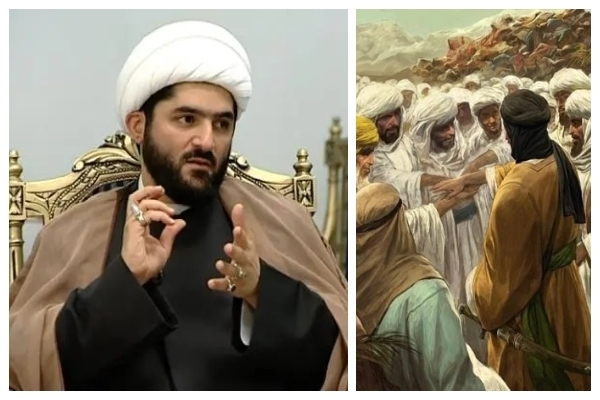Lebanese Thinker Emphasizes Consensus about Unparalleled Virtues of Imam Ali


Sheikh Ahmed al-Dar al-Amili made the remark in a speech about the auspicious occasion of Eid al-Ghadir.
The event of Ghadir, or Eid al-Ghadir is celebrated by Shia Muslims around the world every year.
It is among important feasts and happy holidays of Shia Muslims held on the 18th day of Dhul Hijjah in the lunar Hijri calendar, which fell on Saturday, June 14, this year.
It was the day when according to reports, the Holy Prophet (PBUH) appointed Ali ibn Abi Talib (AS) as his caliph and the Imam after himself following an order from God.
Excerpts from Sheikh Ahmed al-Dar al-Amili’s speech are as follows:
The Almighty God has bestowed upon Imam Ali (AS) virtues and characteristics that are found in no other individual. Muslim scholars—both Shia and Sunni—have written numerous books describing the virtues of Imam Ali (AS).
Among the most famous and universally recognized of these virtues—acknowledged by all Muslims—are: His birth inside the Kaaba (the House of God), His marriage to the noblest woman of creation, Lady Fatima al-Zahra (SA), the daughter and progeny of the Prophet Muhammad (PBUH),and many other such distinctions.
Among the unique qualities that Allah the Exalted has granted exclusively to Imam Ali (AS) is one that, if a Muslim reflects deeply upon it, they will realize that after the Prophet (PBUH), devotion should be directed solely to Imam Ali (AS) and no one else.
To understand this, we must examine the books, traditions, and narrations from the Prophet’s (PBUH) companions regarding Imam Ali’s virtues. When we study these narrations, we find that all Muslims—without exaggeration—have cited tens, hundreds, even thousands of Hadiths about the virtues of the Commander of the Faithful (AS).
There are even books (some now lost) whose authors stated that tens of thousands of Hadiths exist about Imam Ali’s merits—though that is not our focus here. For us, the existence of dozens of authentic narrations is sufficient proof.
Some scholars have compiled these narrations in their works, some dedicated entire chapters to them, and others wrote entire books—such as those titled Manaqib Ali ibn Abi Talib or Manaqib Amir al-Mu’minin (AS)—which are accepted by all Muslims. In all these works, we see unanimous agreement that these virtues are either mass-transmitted (mutawatir), widely known (mashhur), or authenticated by all narrators.
Read More:
Yet, there is no consensus—not even unity of opinion—on a single virtue for those who claimed superiority over Imam Ali (AS). Isn’t this astonishing? It is truly remarkable that narrators unanimously affirm dozens of virtues for Imam Ali (AS), but cannot agree on even one virtue for anyone else. They do not concur on a single merit for any other figure—while simultaneously confirming countless virtues for Imam Ali (AS).
Thus, we conclude that despite their sectarian, ideological, or political differences—even those who deceived or conspired against him—all Muslims agree that Imam Ali (AS) possessed unparalleled virtues, while no one else has even one universally accepted virtue. Not a single one!
Does this not compel us to profoundly reflect on the path we have taken in following Imam Ali (AS)? Indeed, deep contemplation is necessary.



